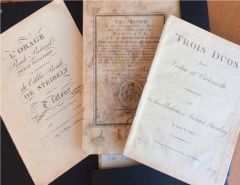Private Collections and Libraries - Part 2
Thursday, September 18, 2025

In this second part of our introduction to private collections and libraries, we would like to focus on collections that have a long history of continuity, or happen to be relatively young but have already found a safe haven in an institution. In addition, we will also discuss the relocation of private households together with their collections.
The Princely Fürstenberg Court Library in Donaueschingen (RISM siglum D-DO; RISM Catalog | RISM Online) is considered as one of the largest aristocratic libraries in Germany. With a few exceptions, its music collection was purchased by the state of Baden-Württemberg for the Badische Landesbibliothek Karlsruhe in October 1999 for conservation reasons. At the same time, the professional cataloguing of the sources was carried out in collaboration with RISM. Since then, the collection has been part of the music collection in Karlsruhe (RISM siglum: D-KA), while a few items, such as donations, have remained in the Donaueschingen Court Library and are kept in the building of the Fürstenberg family archive in Donaueschingen. The descriptions of these sources, primarily autographs, are still found under the RISM siglum D-DO, but the majority of the Donaueschingen collection is now available in Karlsruhe and (in our online database) under the siglum D-KA, with an additional note identifying the previous owner: “Fürstlich Fürstenbergische Hofbibliothek” (RISM Catalog | RISM Online}.
The Tamássy-Pauw Public Library (RISM code: ZA-STtp; RISM Catalog | RISM Online is located in Stellenbosch, South Africa, at the Africa Open Institute for Music. Its owner is Dr. Esther Marie Pauw, who not only teaches there but also curates her private collection and makes it available to the public. The collection was bequeathed to Dr. Pauw by the Hungarian-born flutist Éva Martha Tamássy (1936-2018), and consists primarily of music for flute and chamber ensemble. It also includes works by South African composers and some performance material of the Collage Ensemble.
Finally, we would like to address the question of what happens to the RISM siglum - which includes a direct reference to the location – if the owner of a private collection moves to another home. If the RISM Editorial Center receives notification of such a change, the old RISM siglum will be adapted to the new location. A case in point is the “Martin Bierwisch Private Collection,” today located in Hamburg, which therefore currently has the RISM siglum D-Hbierwisch (RISM Catalog | RISM Online). However, until quite recently, Mr. Bierwisch was based in Budenheim (Rhineland-Palatinate), and so his collection was referred to as D-BUDbierwisch. This now outdated siglum has not been deleted from our database, but rather added as a “former siglum” to the new entry associated with the Hamburg location. Accordingly, the old siglum can still be found in our online database (https://rism.online/institutions/30080138), thanks to which a search for outdated sigla that our users may still encounter in older publications or on the internet will lead them to the up-to-date siglum entry. This means that references to all the sources belonging to such a relocated collection remain traceable and thus valid.
We are currently working on combining the different types of private collections and libraries appearing in our database under the single label “private collection,” and thereby make them easier to find and search. This process requires quite a bit of technical and manual work on our data. With that in mind, our readers may kindly expect a third (and final) part of this topical overview in a mere few weeks’ time.
Part 1 of this text can be found here.
Image: Music prints from the private collection of Martin Bierwisch (with kind permission).
Share Tweet EmailCategory: New at RISM

